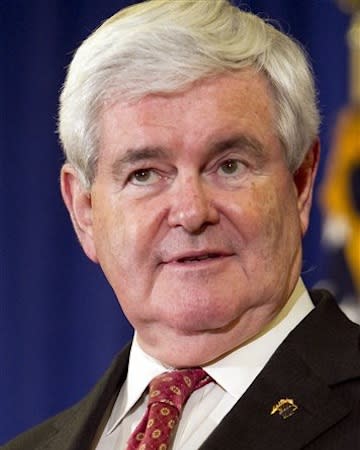 The Ticket
The TicketHow Gingrich could still wreak havoc on the Republican convention

Until Mitt Romney secures 1,144 delegates, Newt Gingrich's aspiration to win the Republican nomination still has a fighting chance—it's a long shot—but there's still a tiny chance.
Gingrich has acknowledged that it would be impossible for him to win a majority of the delegates through the traditional primary process, and he has shifted his strategy to convincing individual Republican delegates to withhold support for Romney. In the meantime, Gingrich has downsized his campaign by cutting one-third of his staff and has transitioned to a modified and cheaper travel schedule.
The move, after a long stint of primary losses, is nothing short of a fourth-quarter Hail Mary pass. But there are rules set by the Republican National Committee that Gingrich could exploit to make it more difficult for Romney to stake his claim as the official nominee. The RNC, which oversees the primaries, is staying officially neutral as long as no candidate has reached the 1,144 delegates required. "Right now there are still a lot of delegates to be won and a lot of contests to be had, so we're focused on that," said RNC spokeswoman Kirsten Kukowski, noting that the organization could not comment on specific candidate strategies.
In the event that 1,144 delegates pledge support for Romney during the primary season, it's all pretty much over. Gingrich can do very little to keep the contest going, and he has said that he will support Romney against President Barack Obama if this happens. If Gingrich and Santorum were to exit the race now, Romney would obviously sweep up those needed delegates with ease, but as long as they're around, the former Massachusetts governor must continue to pay to campaign for each one. And the harder it is on Romney, the longer Gingrich can stay in the race.
Of course, there are several hurdles that will probably keep Gingrich from realizing his new strategy: Other than the obvious barrier of failing to secure enough delegates, an RNC rule stipulates that every candidate must win a plurality of votes in at least five states to get their name on the ballot at the convention. Gingrich has not yet met that criteria—and it does not appear that he will—but loopholes exist that he can exploit to get around it.
If there are not three candidates on the ballot, a winner will be chosen during the first round of voting at the convention. If it's just Romney versus Santorum at the convention, he's likely toast. So Gingrich needs a scenario that includes multiple rounds. The only way he could succeed is if he can convince delegates for those candidates to abstain from voting. Since there are more than 2,200 Republican delegates at the convention, Gingrich would have to make literally hundreds of very convincing phone calls—a pretty tall order that's not likely to result in his favor. Gingrich's greatest hope lies in the 168 delegates who are RNC members, most of whom are unbound. But even if he could convince every single one to sit out the first round of voting, that still does not bring him close to what he needs to make real trouble for Romney.
If there are three candidates on the first ballot—say, for instance Ron Paul achieves a plurality in five states—Gingrich could get on the second ballot by proving that he has support from delegates in five states. That too, of course, could be wishful thinking.
But for a candidate who must raise money to escape his growing campaign debt and appears to relish making Romney sweat, Gingrich does not have much to lose by staying in as long as possible.
More popular Yahoo! News stories:
• Gingrich cuts staff for lean march to convention
• Obama's solicitor general ties health care law to 'Romneycare'
• Santorum losing ground to Romney in Pennsylvania
Want more of our best political stories? Visit The Ticket or connect with us on Facebook, follow us on Twitter, or add us on Tumblr. Handy with a camera? Join our Election 2012 Flickr group to submit your photos of the campaign in action.

